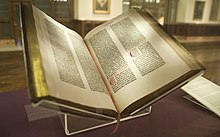
The Mass of Paul VI, also known as the Ordinary Form or Novus Ordo, is currently the most commonly used liturgy in the Catholic Church. It was promulgated by Pope Paul VI in 1969 and its liturgical books were published in 1970; those books were then revised in 1975, they were revised again by Pope John Paul II in 2000, and a third revision was published in 2002.
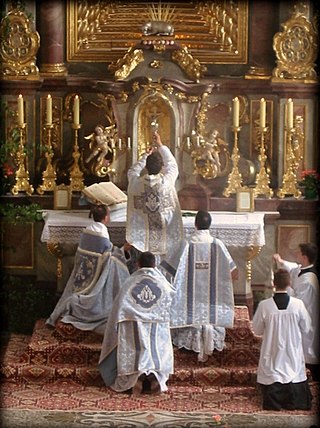
The Tridentine Mass, also known as the Traditional Latin Mass or the Traditional Rite, is the liturgy in the Roman Missal of the Catholic Church published from 1570 to 1962. Celebrated almost exclusively in Ecclesiastical Latin, it was the most widely used Eucharistic liturgy in the world from its issuance in 1570 until the introduction of the Mass of Paul VI.

An acolyte is an assistant or follower assisting the celebrant in a religious service or procession. In many Christian denominations, an acolyte is anyone performing ceremonial duties such as lighting altar candles. In others, the term is used for one who has been inducted into a particular liturgical ministry, even when not performing those duties.
In Christian communities, Bible study is the study of the Bible by people as a personal religious or spiritual practice. In many Christian traditions, Bible study, coupled with Christian prayer, is known as doing devotions or devotional acts. Many Christian churches schedule time to engage in Bible study collectively. The origin of Bible study groups has its origin in early Christianity, when Church Fathers such as Origen and Jerome taught the Bible extensively to disciple Christians. In Christianity, Bible study has the purpose of "be[ing] taught and nourished by the Word of God" and "being formed and animated by the inspirational power conveyed by Scripture".
An apostolic constitution is the most solemn form of legislation issued by the Pope. The use of the term constitution comes from Latin constitutio, which referred to any important law issued by the Roman emperor, and is retained in church documents because of the inheritance that the canon law of the Catholic Church received from Roman law.
An episcopal conference, sometimes called a conference of bishops, is an official assembly of the bishops of the Catholic Church in a given territory. Episcopal conferences have long existed as informal entities. The first assembly of bishops to meet regularly, with its own legal structure and ecclesial leadership function, is the Swiss Bishops' Conference, which was founded in 1863. More than forty episcopal conferences existed before the Second Vatican Council. Their status was confirmed by the Second Vatican Council and further defined by Pope Paul VI's 1966 motu proprio, Ecclesiae sanctae.
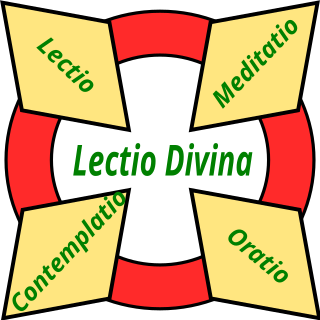
In Western Christianity, Lectio Divina is a traditional monastic practice of scriptural reading, meditation and prayer intended to promote communion with God and to increase the knowledge of God's word. In the view of one commentator, it does not treat Scripture as texts to be studied, but as the living word.

The Mass is the central liturgical service of the Eucharist in the Catholic Church, in which bread and wine are consecrated and become the body and blood of Christ. As defined by the Church at the Council of Trent, in the Mass "the same Christ who offered himself once in a bloody manner on the altar of the cross, is present and offered in an unbloody manner". The Church describes the Mass as the "source and summit of the Christian life", and teaches that the Mass is a sacrifice, in which the sacramental bread and wine, through consecration by an ordained priest, become the sacrificial body, blood, soul, and divinity of Christ as the sacrifice on Calvary made truly present once again on the altar. The Catholic Church permits only baptised members in the state of grace to receive Christ in the Eucharist.
Summorum Pontificum is an apostolic letter of Pope Benedict XVI, issued in July 2007. This letter specifies the circumstances in which priests of the Latin Church could celebrate Mass according to what Benedict XVI called the "Missal promulgated by Blessed John XXIII in 1962" and administer most of the sacraments in the form used before the liturgical reforms that followed the Second Vatican Council.

The 1983 Code of Canon Law, also called the Johanno-Pauline Code, is the "fundamental body of ecclesiastical laws for the Latin Church". It is the second and current comprehensive codification of canonical legislation for the Latin Church of the Catholic Church. It was promulgated on 25 January 1983 by John Paul II and took legal effect on the First Sunday of Advent 1983. It replaced the 1917 Code of Canon Law which had been promulgated by Benedict XV on 27 May 1917.
Evangelii nuntiandi is an apostolic exhortation issued on 8 December 1975 by Pope Paul VI on the theme of Catholic evangelization. The title, taken from the opening words of the original Latin text, means "in proclaiming the Gospel". It affirms the role of every Christian, not only ordained ministers, priests, and deacons, or religious, or professional church staff, in spreading the Gospel of Jesus Christ.
In the Roman Catholic Church, the term minister is used with various meanings. Most commonly, the word refers to a person, either lay or ordained, who is commissioned to perform some act on behalf of the Catholic Church. It is not a particular office or rank of clergy, as is the case in some other Christian organisations; rather, minister may be used as a collective term for vocational or professional pastoral leaders including clergy and non-clergy. It is also used in reference to the canonical and liturgical administration of sacraments, as part of some offices, and with reference to the exercise of the lay apostolate.
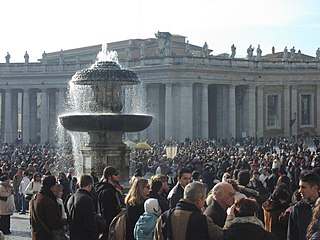
Catholic laity are the ordinary members of the Catholic Church who are neither clergy nor recipients of Holy Orders or vowed to life in a religious order or congregation. Their mission, according to the Second Vatican Council, is to "sanctify the world".
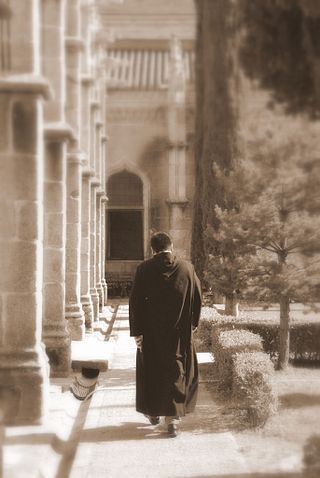
Prayer has been an essential part of Christianity since its earliest days. As the Middle Ages began, the monastic traditions of both Western and Eastern Christianity moved beyond vocal prayer to Christian meditation. These progressions resulted in two distinct and different meditative practices: Lectio Divina in the West and hesychasm in the East. Hesychasm involves the repetition of the Jesus Prayer, but Lectio Divina uses different Scripture passages at different times and although a passage may be repeated a few times, Lectio Divina is not repetitive in nature.
The new evangelization is the particular process by which baptized members of the Catholic Church express the general Christian call to evangelization.
Evangelii gaudium is a 2013 apostolic exhortation by Pope Francis "On the proclamation of the Gospel in today's world". In its opening paragraph, Pope Francis urged the entire Church "to embark on a new chapter of evangelism". According to the exhortation, the Church must understand itself as a community of missionary disciples, who are "permanently in a state of mission".

The Extraordinary Jubilee of Mercy was a Catholic period of prayer held from 8 December 2015, the Solemnity of the Immaculate Conception, to 20 November 2016, the Feast of Christ the King. Like previous jubilees, it was seen by the Church as a period for remission of sins and universal pardon focusing particularly on God's forgiveness and mercy. It was an extraordinary Jubilee because it had not been predetermined long before; ordinary jubilees are usually celebrated every 25 years.
Magnum principium is an apostolic letter issued by Pope Francis and dated 3 September 2017 on his own authority. It modified the 1983 Code of Canon Law to shift responsibility and authority for translations of liturgical texts into modern languages to national and regional conferences of bishops and restrict the role of the Congregation for Divine Worship and the Discipline of the Sacraments (CDW). It was made public on 9 September 2017 and its effective date was 1 October of the same year.

The Sunday of the Word of God is an annual commemoration in the Catholic Church taking place on the third Sunday in Ordinary Time, during January. Pope Francis’ associated motu proprio, Aperuit illis, was published on 30 September 2019 and establishes that "the Third Sunday in Ordinary Time is to be devoted to the celebration, study and dissemination of the Word of God". The day first took place on 26 January in 2020.
Traditionis custodes is an apostolic letter issued motu proprio by Pope Francis, promulgated on 16 July 2021 regarding the continued use of pre-Vatican II rites. It restricts the celebration of the Tridentine Mass of the Roman Rite, sometimes colloquially called the "Latin Mass" or the "Traditional Latin Mass". The apostolic letter was accompanied by an ecclesiastical letter to the Catholic bishops of the world.
